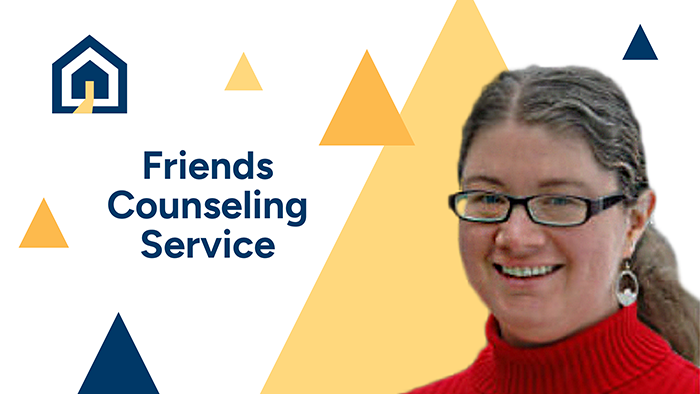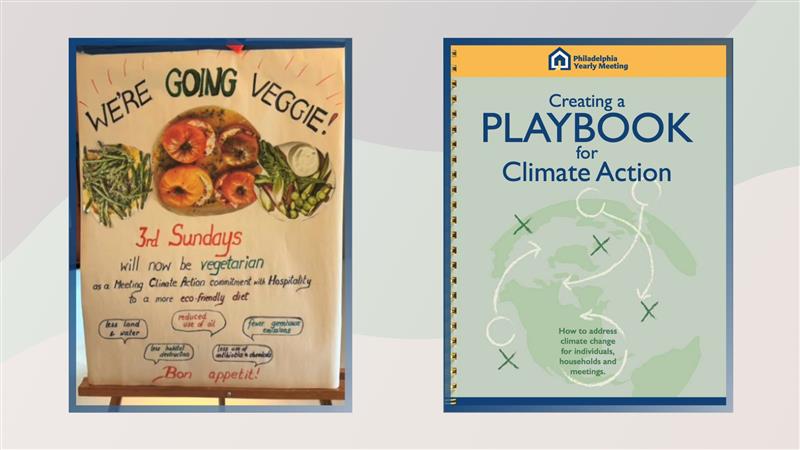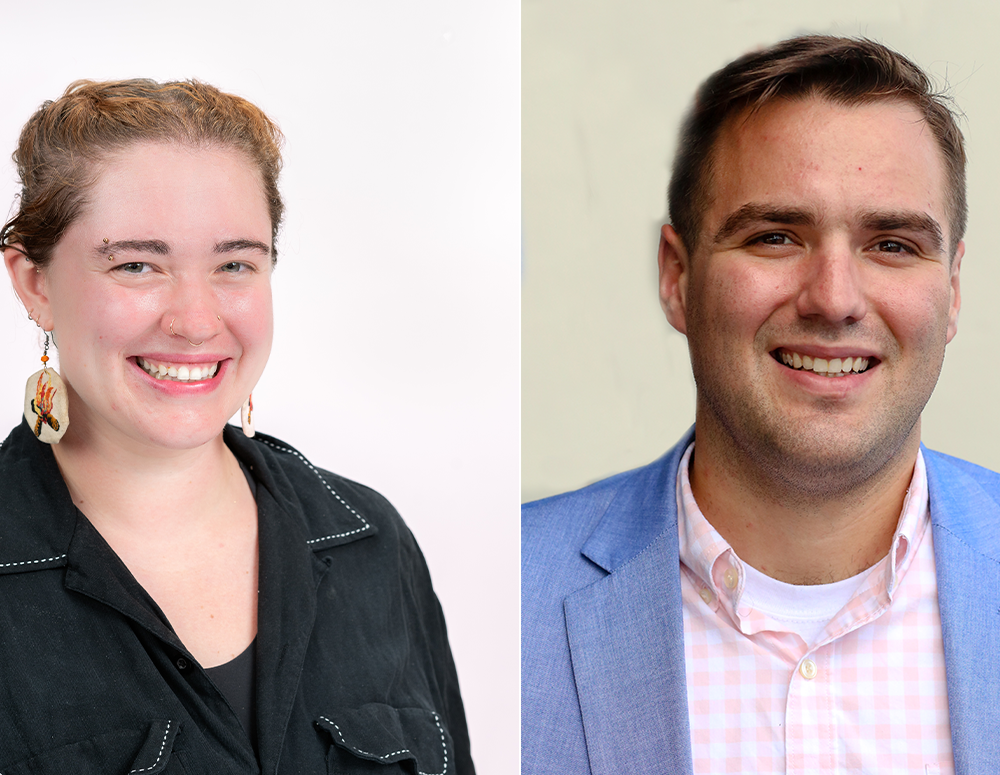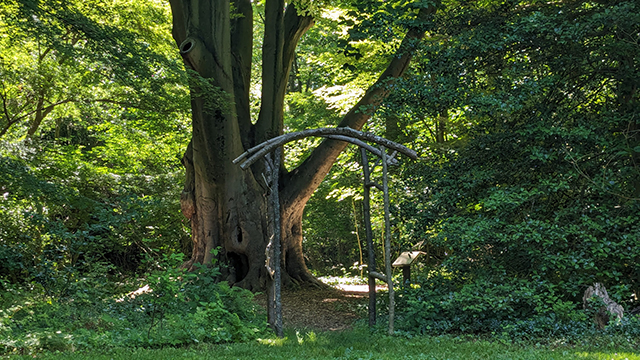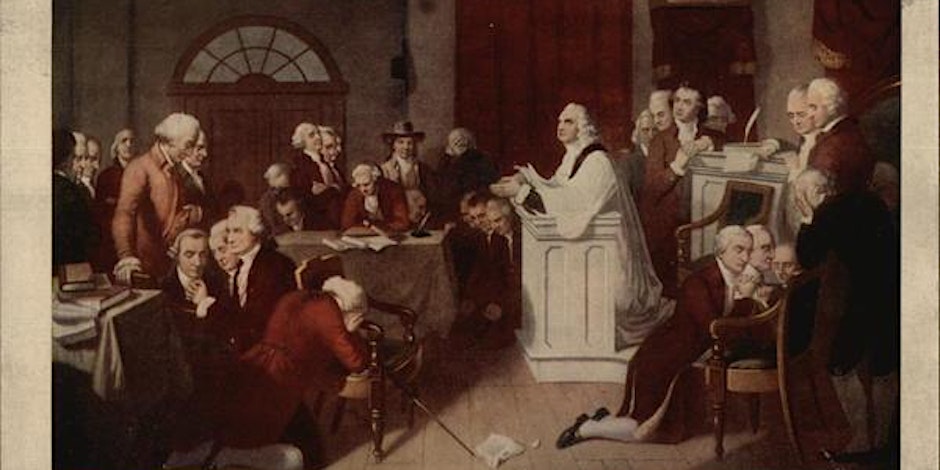The Friends Counseling Service (FCS) serves members and attenders of Philadelphia Yearly Meeting (PYM) who are in search for guidance, comfort, and assistance. This service offers accessible mental health care to Friends across PYM with counselors providing individual therapy, couples counseling, and family therapy sessions. We connected with Janaki Spickard Keeler, Friends Counseling Service Coordinator, who provided additional insight into the service by answering some key questions.
Philadelphia Yearly Meeting
Chestnut Hill Friends Meeting on “Going Veggie” and Using “Creating a Playbook for Climate Action”
Chestnut Hill Friends Meeting has embraced a new initiative to support climate action by “going veggie” on the third Sunday of each month. This meeting-wide project is the result of collaboration between the Climate Action and Hospitality Committees, reflecting a shared commitment to addressing climate change.
Sarah Whitman, a member of both committees at Chestnut Hill Friends Meeting, shared her perspective and the behind-the-scenes on this new initiative. “Last spring, we started a Climate Action Committee to help the meeting address climate change,” Sarah shared. “There have been individual leadings and practices related to climate change, but not a project that the whole meeting does together. I happen to be a member of both Hospitality and the Climate Action Committee, so I felt like this was an opportunity for synergy between those two committees.”
Answer the Call: Share How Your Meeting is Engaging for Election Day
As Election Day, November 5th, approaches, Philadelphia Yearly Meeting is asking members and monthly meetings to share how they are preparing and engaging Friends and their communities. From participating in the election efforts to spirit-led discussions. Friends are called to act, and PYM wants to hear how your meeting is living out that call. Whether your meeting is doing voter registration drives, holding discussions on community responsibility, or engaging in prayerful reflection, let us know what Friends are doing near you to inspire and mobilize your region for the upcoming election!
[Read more…] about Answer the Call: Share How Your Meeting is Engaging for Election Day
Philadelphia Yearly Meeting Staff Updates: Introducing Ember Eldridge and Isaac Garrison
There were many changes for the PYM youth staff over the summer months. Sadly, we said goodbye to Alix Vallery (MSF Co-Facilitator) and Clare Chalkley (YF Co-Facilitator), who have moved on to new adventures. Alix and Clare served PYM youth with such kindness and commitment, and we are so grateful for all that they contributed to our programs. We will miss them, and we wish them many blessings as they continue their life journeys.
Aging Together in the Spirit: An Online Series
Join Friends for a three-part online series exploring Baltimore Yearly Meeting’s new book on a Quaker approach to death and dying, A Tender Time: Quaker Voices on the End of Life. Explore practical, emotional, and spiritual aspects of aging, dying well, and making end-of-life decisions guided by the Spirit and Quaker values.
[Read more…] about Aging Together in the Spirit: An Online Series
Christie Duncan-Tessmer Joins Panel on Faith’s Role in American Democracy
Christie Duncan-Tessmer, General Secretary of Philadelphia Yearly Meeting, will be participating on a panel with people from historic churches in Philadelphia. Christie will be offering a Friends’ perspective about their role in faith during the American Revolution and discussing its continued influence on modern American democracy. The panel will reflect on the historic practice of Congressional prayer, a tradition initiated by Rev. Jacob Duche (1737-1798), the rector of Christ Church in Philadelphia, who is best known for delivering the first prayer at the Continental Congress in 1774. This event marked the beginning of opening Congressional sessions with prayer, highlighting the significant role of faith in American governance—a tradition that continues today, illustrating the enduring connection between religion and public life in the United States.
[Read more…] about Christie Duncan-Tessmer Joins Panel on Faith’s Role in American Democracy
Changes to Council Meetings
Our current governance structure was set up with a goal of simplifying our governance and administration. Some adjustments have been made, such as adding a Clerks Group which encourages the clerks of the councils and officers of the yearly meeting to all collaborate. Another change is that the three councils, Quaker Life, Administrative and Nominating, have met jointly for about an hour every month for many years now. Over the course of the past two years, the clerks and Governance Advisory Committee have been watching for new opportunities that allow the councils to be increasingly effective in meeting our community’s needs, responsive to the spirit and respectful of the council members’ commitment.
Grant Applications Coming Due September 1 – Apply Now!
Please be aware of the following grants that are now available through PYM.
[Read more…] about Grant Applications Coming Due September 1 – Apply Now!
Sprint: Map to the Destination of Connecting our Meetings
A primary intention of a yearly meeting is to connect its meetings, Friends and ministries. Connecting is also one of Philadelphia Yearly Meeting’s strategic directions. In the past year, we’ve been developing a vision of a community where all of our meetings are highly connected to one another. When Friends were asked at Continuing Sessions and in an email and a paper mailing to thousands of households what it looks like when meetings connect, their responses included impacts on committees, on individuals, on monthly meetings and on quarterly meetings. Here are a few:
- Committees from several meetings convene together. For example, Religious Ed Committees of three or four meetings jointly gather on zoom.
- Not every meeting has to do every thing. One meeting might anchor peace work in a region while another does outreach for multiple meetings.
- When there is an issue, such as burial ground maintenance or conflict resolution, that is common to many meetings, they gather together to assess and address it.
- Council members attend quarterly meeting events.
- Everyone knows where Upper Susquehanna Quarterly Meeting is!
You can watch a video that shares some of the ideas as well. If you have thoughts about what it will look like when meetings are all connected, you can still share them through this online form.
The next step is to develop a map that can guide us to this destination we’ve envisioned.
At Annual Sessions, the body approved a Sprint to “identify strategies and pathways to help navigate to a place where our meetings are connected based on the vision of PYM Friends.” A “sprint” is a short-term, focused, committee that will draw on the gifts and experiences of Friends across our community to get a job done or launch an initiative. The full sprint charge can be read below.
This sprint will include 5-8 people who will report back to Sessions in March with a recommended map. They will develop a wide range of ideas about the strategies, activities, resources, etc., that could move us from our current location to the envisioned destination of connected meetings. The initial list may include impossible ideas! They’ll test their ideas with PYM Friends and then develop a set of possible pathways.
The approved charge indicates that Sprint members will be PYM Friends who have familiarity with our meetings and bring a strategic and or creative mindset and carry a sense of curiosity and hopefulness. The sprint will include at least:
- One person active in their local meeting but not in the yearly meeting community
- One person active in their quarterly meeting but not in the yearly meeting community
- One person who is not staff or governance who is a young adult (under 35ish) and one who is in the second third of adulthood (35-60)
- One council member
- One staff member from communications and/or program
Friends who are interested in being considered for the sprint or who have a name to suggest are invited to share that with Cecilia Filauro, Executive Administrator, at cfilauro@pym.org by the end of August.
Sprint: Map to the Destination of Connecting our Meetings
Charge:
To identify strategies and pathways to help navigate to a place where our meetings are connected based on the vision of PYM Friends.
Background:
A destination of the first strategic direction, Connecting, is to increase the interactions that meetings have with one another. Friends have been asked to contribute to a vision of what it looks like when we arrive at the place of interconnected meetings. They responded at Continuing Sessions, at Council meetings and through a fundraising and email appeal on the subject. The next step is to make a map to get to that destination.
Composition of the Sprint:
The sprint will include 5-8 members. The membership of the sprint will include at least:
- One person active in their local meeting but not in the yearly meeting community
- One person active in their quarterly meeting but not in the yearly meeting community
- One person who is not staff or governance who is a young adult (under 35ish) and one who is in the second third of adulthood (35-60)
- One council member
- One staff member from communications and/or program
Sprint members will be PYM Friends who have familiarity with our meetings and bring a strategic and or creative mindset and carry a sense of curiosity and hopefulness.
Accountability:
The sprint will be approved by and report to the yearly meeting in session. Its members will be approved by Administrative Council (Admin) and Quaker Life Council (QLC). Between sessions the sprint will be held accountable by Admin and QLC which will ensure that it maintains momentum and the work is completed. In the event the sprint requires assistance, whether the need is perceived by the sprint itself or by others, Admin and QLC are responsible for providing the assistance.
Responsibilities (what the sprint will do):
- Become familiar with the shared visions of what it will look like when our meetings are well-connected.
- Become familiar with the structure of PYM’s governance and staff and the locations of all of our meetings.
- Identify the current strengths, weaknesses, opportunities and pressures that will help or hinder our reaching the destination.
- Inventory the ways meetings currently connect with each other.
- Develop a wide range of ideas about the strategies, activities, resources, etc that could move us from our current location to the destination of connected meetings. The initial list may include impossible ideas!
- Develop a set of possible pathways.
- Share possibilities with councils and others to receive fresh perspectives and feedback.
- Develop a first draft proposed map to reach our destination.
- Consult with any individuals or bodies that would be required to provide any kind of action or resources when enacting the proposal (councils, committees, meetings, staff, for example)
Outcomes (what will happen as a result of the sprint carrying out its responsibilities):
- At least two opportunities for PYM Friends to play with ideas about pathways with the sprint and to ask questions and provide feedback on the sprint’s work in progress.
- Give a status report to Continuing Sessions in November
- Post an update to the PYM website about the progress of the sprint on an alt-monthly schedule at a minimum.
- By March Continuing Sessions present a proposed plan (“map”) that identifies:
- Specific outcomes of how our meetings will be connected
- Recommended actions for our community that will result in reaching outcomes
- Who would be responsible for the actions
- Who would be consulted about the actions along the way.
- A timeline for the actions.
Next Steps (what will happen after the work of the sprint is complete):
- The councils will propose next steps based on the reception of the proposed map at Continuing Sessions.
- The councils will be responsible for taking and reporting on next steps. Possibilities include activating additional sprints, discerning with the wider body, setting up a committee, working with staff, etc.
Religious Education Resources & Events Fall 2024
Summer is waning, the crickets are singing, and it’s time to get ready for the next year in religious education programs! The Fall issue of The Tote Bag: Religious Education and Family Resources is here to support getting ready for children, youth, and intergenerational programs in meetings. This includes new resources to support middle school engagement, explore Bible stories with children, and how to talk together with young people about election issues. With the upcoming election in November, staff have been thinking about how to support families and young people to feel grounded in our testimonies of integrity and peace. Two specific events for adults and children/youth are happening this fall. Read on!
[Read more…] about Religious Education Resources & Events Fall 2024
